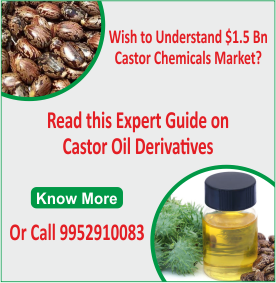Castor Oil C-3 Derivatives
Glycerin:
Production:
Glycerine (Glycerol) is a key product of transesterification reaction in castor oil with properties of high viscosity and transparency. It can be produced from synthetic as well as biological sources with castor oil as a potential source. On processing an unit tone of vegetable oil, a mass of one quintal glycerol is generated.
Specifications:
|
CAS Number |
56-81-5 |
|
Molecular Formula |
C3H8O3 |
|
Molecular Weight |
92.0542 |
|
Physical State |
Liquid |
|
Appearance |
Clear |
|
Odor |
Faint odour |
|
Vapour Pressure |
.0025 mm Hg @ 5 |
|
Vapour Density |
3.17 (H2O=1) |
|
Boiling Point |
290oC |
|
Freezing/Melting Point |
20oF |
|
Autoignition Temperature |
400oC ( 752.00 deg F) |
|
Flash Point |
193oC ( 379.40 deg F) |
|
Decomposition Temperature |
290oC |
|
Solubility |
Miscible in water. Insoluble in chloroform |
|
Specific Gravity/Density |
1.4746 |
Applications:
Glycerine is used in cosmetics, foods, pharmaceuticals, and a variety of personal care and oral care products, as well as in other applications including animal seed, antifreeze and certain energy uses.
Uses of glycerine by industry
v Food and beverages - Humectant, solvent, sweetener, and preservative.
v Pharmaceuticals - Solvent, moistener, humectant, and bodying agent in tinctures, elixirs, ointments, and syrups; plasticizer for medicine capsules; other uses include suppositories, ear infection remedies, anesthetics, cough remedies, lozenges, gargles, and carrier for antibiotics and antiseptics.
v Cosmetics and toiletries - Humectant, vehicle, and emollient in toothpaste, skin creams and lotions, shaving preparations, deodorants, and makeup.
v Tobacco - Keeps tobacco moist and soft to prevent breaking and crumbling during processing; ensures freshness in packaged cigarettes and other tobacco products.
v Surface coatings - Used in the manufacture of alkyd resins, which are important components of surface coatings.
v Paper and printing - Plasticizer, humectant, and lubricant in the manufacture of paper; used with other ingredients in specialty treatments such as grease-proofing; alkyd resins also an important constituent of many printing inks.
v Lubricants - Because of its nontoxic character, used in lubricants for food and other machinery where product purity is essential.
v Textiles - Conditioning agent used widely in lubricating, sizing, and softening yarn and fabric; lubricates many kinds of fibers in spinning, twist setting, knitting, and weaving operations.
v Rubber and plastics - Lubricant and plasticizer for plastic.
v Urethane polymers - Fundamental chemical component of polyethers for urethane foams.
v Electrical and electronics - Widely employed in manufacturing electrolytes for electrolytic condensers, which are used in radios and neon lights, and in processes for electrodeposition and treatment of metals.
v Nitration - Used to make nitroglycerine, which is the usual explosive in dynamite and a cardiovascular agent.








